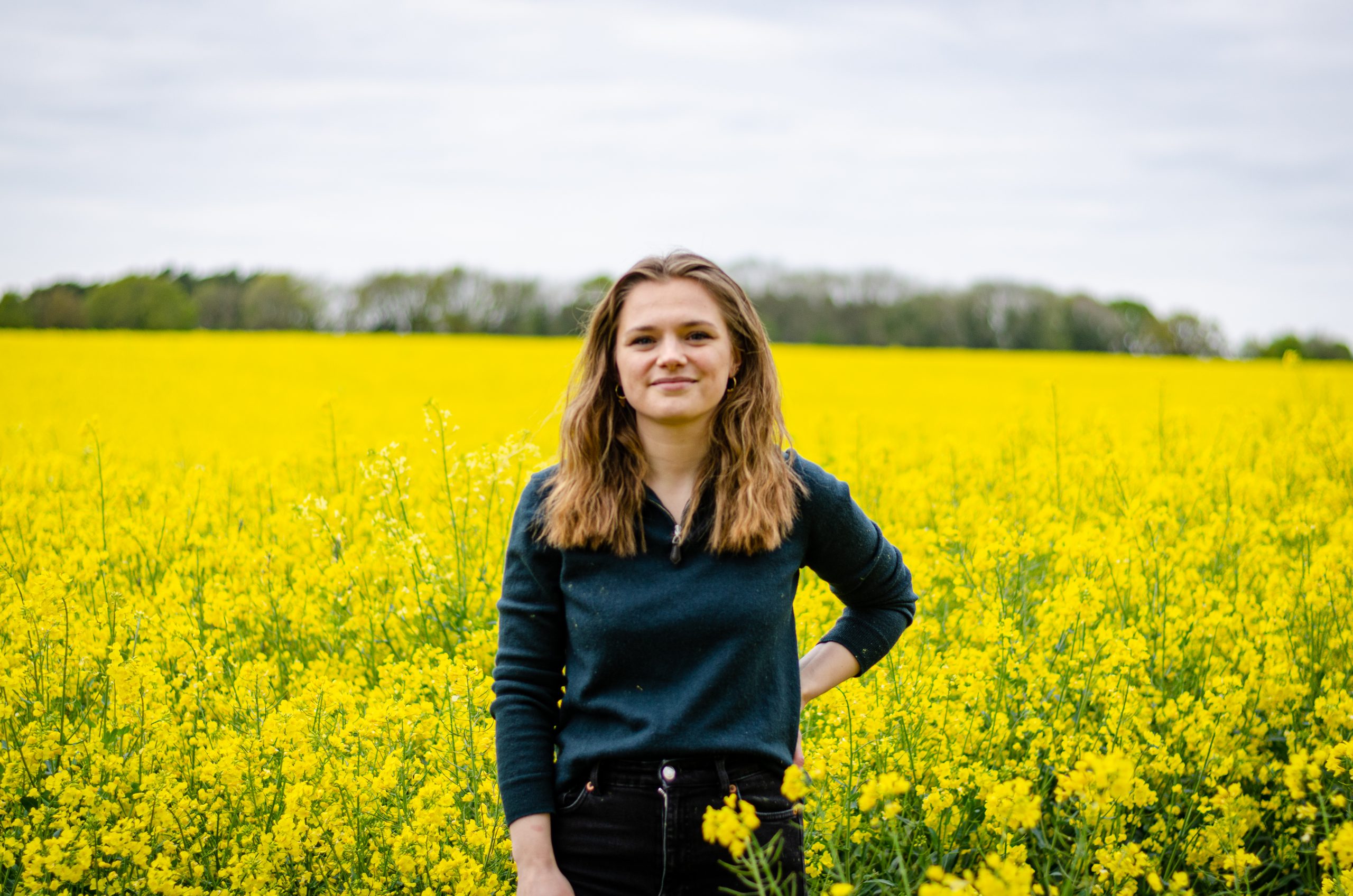
June 14, 2022, by Lexi Earl
Reducing disease in oilseed rape: An interview with Lisa Humbert
Lisa Humbert is a PhD candidate with the Graduate Centre for International Agriculture, a joint partnership between the University of Nottingham’s Future Food Beacon and Rothamsted Research. Lisa’s project is titled “Fungal sex factors as novel antifungal compounds for control of plant disease.” They are supervised by Dr David Withall (RRes), Prof Paul Dyer (UoN) and Dr Mike Birkett (RRes). Lisa joins us from France.
Why did you decide to do a PhD? What were you doing before?
I started by completing a BSc in Chemistry in Orleans followed by a MSc in Chemistry of Biomolecules at the University of Montpellier, France. I then moved to Belgium to work as a synthetic chemist in Research & Development for the pharmaceutical industry. Although this job offered a perfect application of the training I received during my education, and in a good working atmosphere, I felt frustrated to be restrained to the chemistry part of the project I was on. I decided to continue my education with a PhD, as I was eager to gain experience in different areas of biology, that could be used in synergy with my chemistry expertise to support my research activities. My aim is to be able to understand and resolve challenges in both fields, as many research problems nowadays are multidisciplinary.
Why did you choose this particular PhD project?
Having previously done an internship in the chemical ecology group at Rothamsted Research, my interest developed in finding solutions to global issues which are mimicking nature’s patterns. When I saw this project with a Future Food Beacon studentship, in collaboration with that same group from RRes, I knew it would be the perfect opportunity to expand my skills while working on a major global problem.
Tell us about your research. What do you study? Why is it important?
My research concerns the mitigation of damage caused by light leaf spot, a devastating disease of oilseed rape and other Brassicae crop species. The causative agent of this disease is the filamentous fungus Pyrenopeziza brassicae, predominantly present in the UK, but now also a concern across Northern Europe, Oceania, Asia and North America. Overcoming the £160M annual yield losses caused by light leaf spot in the UK is a significant challenge due to the increasing resistance of the fungus to common broad-spectrum fungicides. The progression of this disease relies on seasonal cycles of sporulation; asexual sporulation widely participates to spread the fungus in autumn, facilitating proximity between partners for sexual sporulation to occur later in the summer.

Light leaf spot disease in a Petri dish
Initiation of the sexual cycle is complex, yet requires signalling by hormones produced by the fungus, a key element inducing a switch from asexual reproduction to sexual reproduction. My research builds on previous work on this hormone in P. brassicae, aiming to characterise the biologically active compound and synthesise a synthetic analogue. The ultimate aim would be the mass application of this analogue in oilseed rape fields to prevent the spread of disease by inhibiting asexual sporulation of the pathogen. This project is not only important to help farmers increase yields in oilseed rape and vegetable brassica production, but also to reduce the use of non-targeting fungicides which can be harmful for other organisms in the long term.
How do you explain your research to ordinary people?
My research aims to reduce disease in the important crop – oilseed rape – which is used globally for the production of cooking oils, representing a real financial interest for the UK. I am investigating a novel method of manipulating the natural lifestyle of the disease, causing it to be less effective at infecting vulnerable crops.
How is your first year going? Any highlights?
This first year has been really fulfilling so far. Thanks to that collaboration between RRes and UoN, I get to be part of two different research groups, which I guess is quite unusual for a PhD. This was a real highlight this year, as I was able to spend a few months working with the fungal biology group at Nottingham and a few months in the chemical ecology group at RRes. It was enriching to build relationships with researchers from diverse research interests and learn from them about different topics.

Lisa in the lab
Has undertaking a PhD been different from other degrees you have done? How so?
Other degrees are based mainly on learning theoretical sciences through lectures; a PhD is more about applied practical work, which makes you evolve much quicker. You are given four years to solve a problem, so it implies lots of independent work and self-learning.
What have you learnt through your first PhD year?
The main challenge was obviously learning a field of science that I was completely unfamiliar with. After three months of intensive microbiology training, I have developed much more knowledge and skills in that field than I expected, although I also realised the scope of what still needs to be learnt. Personally, it has definitely taught me how to multitask. Balancing the different experiments, treatment of data, presentations, reports, seminars, taking part in social events and the additional administrative work, is a lot of mental load that we don’t get prepared for in scientific degrees.
How do you cope with the pressure of doing a PhD?
Undergoing a PhD can be very overwhelming, so I like to balance the pressure by living a slower life around the weekends. I have recently begun an allotment project with a friend, as I have always been interested in being self-sufficient. It’s really rewarding to instill a more sustainable lifestyle in accordance with the ecological implication of my project. Being away from my home country also means I get to visit places around the UK whenever I have the chance.
No comments yet, fill out a comment to be the first

Leave a Reply